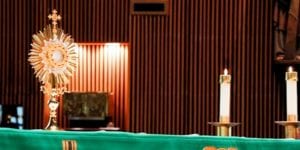
Lesson 10
The Most Blessed Sacrament of the Eucharist
The Catholic Church is made up of people from various cultures and traditions. Despite these differences, we are united in the Eucharist. Each Sunday, we gather together in faith to celebrate the Eucharist. More than 2,000 years ago, Jesus Christ instituted the Eucharist at the Last Supper while celebrating the Passover with His disciples. He took the bread, said the blessing, broke it, and gave it to them saying, “This is my Body, which will be given for you; do this in memory of me.” And likewise the cup after they had eaten, saying, “This cup is the new covenant in my Blood, which will be shed for you.” (read Luke 22:19-20)
Catholics all over the world celebrate the Eucharist in the Mass. Even if the Mass may be celebrated in different languages and contain native cultural traditions, the liturgy for the Mass is basically the same all over the world.
Each time Holy Mass is celebrated, the gifts of bread and wine become the Body and Blood of Christ at the Words of Institution:
Take this, all of you, and eat it: this is my Body which will be given up for you.
Take this, all of you, and drink from it: this is the cup of my Blood, the Blood of the new and everlasting covenant. It will be shed for you and for many so that sins may be forgiven. Do this in memory of me.
Jesus Christ is the Eternal Priest of the New Covenant which God made with all humanity. The Eucharist is a Sacrifice because it makes present the Sacrifice of the Cross. In the Eucharist, Jesus Christ is present and He acts through the priest, who offers the Eucharistic Sacrifice – the Sacrifice of the Body and Blood of Christ.
When we receive the Body and Blood of Christ, several things happen:
- Our communion with the Lord is strengthened.
- Our venial sins are forgiven.
- We are able to better love and serve others.
Jesus Christ is present in both species of the Most Blessed Sacrament of the Eucharist: the Consecrated Host (which is also called the Precious Body), and the Consecrated Wine (which is also called the Precious Blood). In the Most Blessed Sacrament of the Eucharist, the Body and Blood, together with the Soul and Divinity, of our Lord Jesus Christ and, therefore, the whole Christ is truly, really, and substantially contained. That is called the Real Presence of Christ in the Eucharist. This “presence” is called “real” because Jesus is present in the Most Blessed Sacrament in the fullest sense: that is to say, it is a substantial presence by which Christ, God and man, makes Himself wholly and entirely present. (CCC 1374)
When we receive the Eucharist in either species, we are receiving Christ whole and entire because Christ is sacramentally present under each of the species. Receiving the Eucharist under the species of the Precious Body alone enables us to receive all the fruits of Eucharistic grace.
After the Celebration of the Eucharist, the Consecrated Hosts which were not consumed are reserved in the tabernacle inside the church or chapel so that it could be brought to the sick and those absent outside of Mass. If the Sanctuary Lamp is lit in the sanctuary, we know that the Eucharist (or the Blessed Sacrament) is reserved inside the tabernacle. When we visit the church or chapel, we can spend time in adoration of the Blessed Sacrament. Adoration is the act of worshipping God. Some churches or chapels have the Exposition of the Blessed Sacrament. This is when the Blessed Sacrament is brought out of the tabernacle and placed in a special vessel called a Monstrance. Here is a picture of a monstrance:
Questions:
- When and how did Jesus institute the Sacrament of the Eucharist?
- True or False: The Holy Mass celebrated in English is basically the same as the Holy Mass celebrated in Chinese or Spanish.
- At what point in the Mass do the gifts of bread and wine become the Body and Blood of Christ?
- What does the Real Presence of Christ in the Eucharist mean?
- True or False: When we receive the Eucharist under any one species, we receive all the fruits of Eucharistic grace.
- What is the purpose of Adoration?